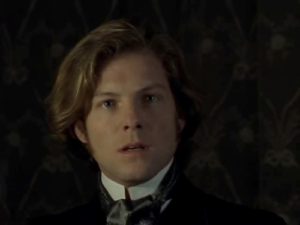This passage from page 22 of the text includes George Talbot on the ship back to London, talking to a lady named Miss Morley. George is furious, passionate, and full of emotion because of Miss Morley talking about how she doubts whether her husband is still well. She also questions George’s laid back state of mind and confidence that nothing has gone wrong after three years. Although, it does not take long for George to change his mind completely and start to lose composure, sanity, and freak out to some degree. He screams and remarks at “what a fool” he is for paying attention to these thoughts, but also asks “why do you come and terrify me out of my senses” which shows that his mind is spoiled and he is no longer as hopeful about his wife being healthy and well (22).
This passage seems to be a turning point for George and for the novel, as dark ideas and thoughts have now entered the story and have become a reality. this passage also signifies a deeper layer of sadness and emotion when George starts to express his deep love for his wife. He said, “I am going straight home to the girl whose heart is as true as the light of heaven” (22). His references to heaven and a later reference to “tomorrow’s sunrise” in this passage touches also offers another connection to religion and nature. This language used by the author is expressed to display a strong sense of affection and confidence by George, but in reality, he is experiencing doubts and worries behind his words due to Miss Morley’s influence.
 (George Talboys from Play ^)
(George Talboys from Play ^)
George Talboys seems to be very concerned about other people seeing his doubts and weaknesses. Not only is this displayed in this part of the book, but also when he is questioned about his fear of thunderstorms. He get very agitated and eventually enraged when he is continuously asked about his fear of storms by Robert during one. The next morning he did apologize saying that he was in fact frightened by them. One reason he may have this fear of people seeing his weaknesses is that he is insecure with his masculinity. This is because a main aspect of masculinity during this time was being able to be a good provider for not only yourself, but your family. Seeing as he was not able to do this and went into poverty shortly after his marriage, he may now be trying to restore his masculinity in ways that are not mentally healthy, like bottling emotions and fears.
After reading further into the novel, I believe this passage becomes more revealing than when we first encountered it. I agree that this appears to be a turning point for George in the novel, however I don’t think that it’s the pivotal moment for him quite yet. I feel as though the ship ride back to London is to setup how much of a toll his wife’s death will have on him. Multiple times throughout the latter portion of Volume One, Robert Audley mentions how it seems as though the death of George’s wife quite literally seemed to take the life out of George himself, something that George promised would happen during this ship ride.